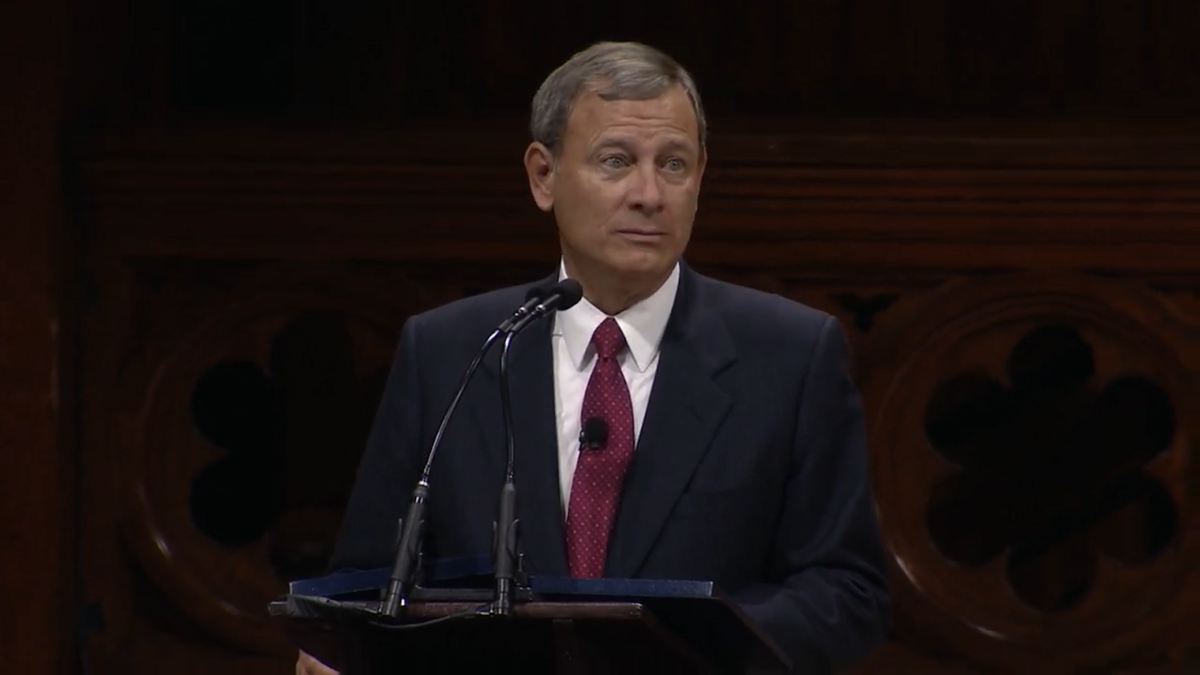 |
| Harvard Law School/YouTube |
If courts can ‘strike down’ the other branches’ actions, as Roberts claims, then that isn’t ‘co-equal.’ It’s judicial supremacism.
It’s a sad day in America when the chief justice of the U.S. Supreme Court ignores the basic framework of the Constitution he’s supposed to interpret.
That’s what happened on Wednesday, when Chief Justice John Roberts took it upon himself to subtly thumb his nose at President Trump and conservatives during a rare sit-down interview in his hometown of Buffalo, New York. In addition to rebuking calls to impeach activist lower court judges for overstepping the confines of the Constitution, the chief justice had this to say about the subject of “judicial independence”:
In our Constitution … the judiciary is a co-equal branch of government, separate from the others, with the authority to interpret the Constitution as law and strike down, obviously, acts of Congress or acts of the president. That innovation doesn’t work if … the judiciary’s not independent. Its job is to, obviously, decide cases, but in the course of that, check the excesses of Congress or of the executive. And that does require a degree of independence.
To quote Vice President J.D. Vance, does John Roberts hear himself?
The chief justice begins by claiming that the judiciary is a “co-equal” branch of government. Then, in the very next breath, he asserts that the courts can “strike down … acts of Congress or acts of the president.”
If the courts can unilaterally “strike down” actions by the legislative and executive it believes to be unlawful or finds unfavorable, as Roberts maintains, then that isn’t “co-equal.” It’s judicial supremacism.
What Roberts is conveying is his apparent belief that the Supreme Court and judicial branch writ large are wholly supreme to the other branches of government. That is, regardless of the will of the people as expressed through their elected representatives, it is judges who have the final say on matters of law and public policy.
While courts play an important role in American society, this is the exact opposite of the system the Founding Fathers established in the Constitution. If anything, the judiciary was viewed by framers like Alexander Hamilton to be the weakest branch, as it lacked “influence over either the sword or the purse” and “must ultimately depend upon the aid of the executive arm even for the efficacy of its judgments.” --->READ MORE HERE
 |
| WIVBTV/YouTube |
Roberts fails to understand that SCOTUS’s continued allowance of leftists’ judicial coup is undermining Americans’ faith in the judiciary.
For someone who’s served as chief justice of the Supreme Court for nearly two decades, John Roberts’ persistent inability to understand the role of a judge in America’s constitutional order is stunning.
On Wednesday, Roberts partook in a sit-down interview at an event in his hometown of Buffalo, New York, in which he added more fuel to the fire of the controversy surrounding the leftist-backed judicial coup seeking to sabotage the Trump administration. Throughout the discussion with his friend and District Court Judge Lawrence Vilardo, the chief justice was asked about his thoughts on “judicial independence” and whether he agrees that such a concept “is crucial.”
Roberts concurred with Vilardo’s sentiment, noting the differences between the U.S. judicial system and that of the English government during the era of America’s founding. Unlike Britain’s system, the U.S. Constitution, the chief justice said, designated “judges and the judiciary [as] a co-equal branch of government, separate from the others, with the authority to interpret the Constitution … and strike down, obviously, acts of Congress or acts of the president.”
“That innovation doesn’t work if … the judiciary’s not independent. Its job is to, obviously, decide cases, but in the course of that, check the excesses of Congress or the executive. And that does require a degree of independence,” Roberts said.
Vilardo then asked Roberts for his thoughts on “calls for impeachment of judges based on the decisions that they’ve made,” likely referencing remarks issued by President Trump and conservatives about activist judges thwarting the former’s executive actions through the use of contravening injunctions.
Nodding to a prior statement he released to legacy media outlets in March, the chief justice reaffirmed his belief that “impeachment is not how you register disagreement with decisions.”
“That’s what we’re there for,” Roberts said.
There are several problems with Roberts’ remarks.
First, neither the chief justice nor the Supreme Court plays any role in the impeachment process of federal judges. As Federalist CEO Sean Davis previously noted, “[T]he question of whether to impeach judges has been left solely to the elected representatives of the American people. John Roberts has no say in the matter, regardless of how much he wishes otherwise.” --->READ MORE HEREFollow link below to a related story:
SCOTUS’s Refusal To End Leftists’ Judicial Coup Is Damaging Its Credibility More Than The Media Ever Could
If you like what you see, please "Like" and/or Follow us on FACEBOOK here, GETTR here, and TWITTER here.

No comments:
Post a Comment